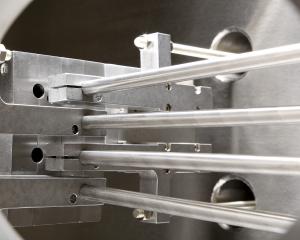Controlling ITER with fuellers, ticklers, and terminators
14 Sep 2015
-
Leo Williams, Oak Ridge National Laboratory
The inside of a pellet selector, which directs pellets to different outputs in a fusion reactor. Photo: ORNL
When it's up and running, the ITER fusion reactor will be very big and very hot, with more than 800 m³ of hydrogen plasma reaching 170 million °C. The systems that fuel and control it, on the other hand, will be small and very cold.
Pellets of frozen gas will be shot into the plasma—some to keep it fuelled, some to manage plasma activity, and some to extinguish the plasma as needed.
The idea of using frozen pellets to fuel a magnetic fusion reactor is not new. Researchers with the Fusion Materials and Nuclear Systems Division at Oak Ridge National Lab (ORNL) have been working on the technology for 35 years. Their handiwork helps run fusion experiments across the world, including America's largest fusion reactor, the DIII-D tokamak operated by General Atomics in San Diego, California.
Their expertise also made them the right choice to take on the much more challenging job of controlling ITER, which is more than eight times larger than the largest fusion reactor now in existence.
"The pellets are much more efficient at fuelling the fusion plasma because they can penetrate fairly deep into the hot plasma before being ablated and ionized into additional plasma," explained Larry Baylor of ORNL's Plasma Technology and Applications Group.
"The alternative method of injecting gas that is primarily used in today's smaller devices will not add fuel efficiently in ITER because of its large size and high magnetic field."
Baylor said his group is working on three types of pellet, which he refers to as fuellers, ticklers, and terminators.
Continue reading the article on the ORNL website.
Pellets of frozen gas will be shot into the plasma—some to keep it fuelled, some to manage plasma activity, and some to extinguish the plasma as needed.
The idea of using frozen pellets to fuel a magnetic fusion reactor is not new. Researchers with the Fusion Materials and Nuclear Systems Division at Oak Ridge National Lab (ORNL) have been working on the technology for 35 years. Their handiwork helps run fusion experiments across the world, including America's largest fusion reactor, the DIII-D tokamak operated by General Atomics in San Diego, California.
Their expertise also made them the right choice to take on the much more challenging job of controlling ITER, which is more than eight times larger than the largest fusion reactor now in existence.
"The pellets are much more efficient at fuelling the fusion plasma because they can penetrate fairly deep into the hot plasma before being ablated and ionized into additional plasma," explained Larry Baylor of ORNL's Plasma Technology and Applications Group.
"The alternative method of injecting gas that is primarily used in today's smaller devices will not add fuel efficiently in ITER because of its large size and high magnetic field."
Baylor said his group is working on three types of pellet, which he refers to as fuellers, ticklers, and terminators.
Continue reading the article on the ORNL website.


